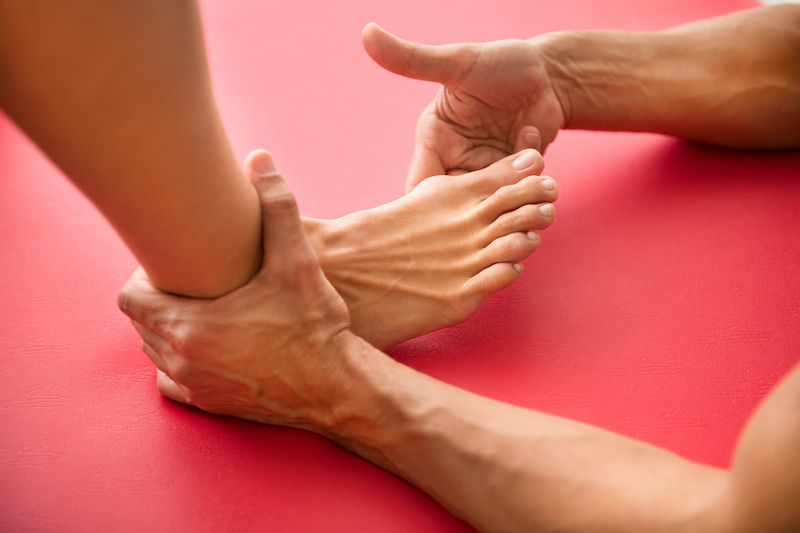How Do You Treat Hallux Rigidus?
Hallux rigidus (otherwise known as big toe arthritis) is a serious condition that can severely limit your mobility and your quality of life. This article will walk you through the key causes, symptoms, and treatments for hallux rigidus.
What causes hallux rigidus?
Hallux rigidus is a form of osteoarthritis that attacks the joint at the base of the big toe. The cartilage that normally cushions the joint suffers wear and tear, meaning the big toe becomes stiff and loses its range of motion. Millions of people suffer from big toe arthritis, making it the leading form of arthritis in the feet.
Flexibility in this joint is critical for many types of movement. For that reason, people with hallux rigidus often have trouble walking or putting pressure on their big toe when they crouch down or stand up.
Many people develop hallux rigidus as the result of abnormal foot structures that alter how they put weight on and move their foot and toe. These structural abnormalities ultimately lead to wear and tear on the joint and end in the development of osteoarthritis.
Common abnormalities include fallen arches and frequent pronation, which refers to the tendency to roll the ankle inward and walk using the inner part of the foot. Abnormal foot structures associated with hallux rigidus tend to be inherited, meaning there is likely a strong genetic component to its development.
Since hallux rigidus is a form of osteoarthritis, overuse and frequent strain can also increase your chance of developing it. Working on your feet all day can strain the joint supporting your big toe, which can lead to hallux rigidus.
In rarer cases, hallux rigidus can be caused by injury or inflammation from conditions like rheumatoid arthritis.
What are the symptoms of hallux rigidus?
Hallux rigidus is a progressive condition, meaning it will continue to get worse over time. Keep an eye out for any of these key symptoms:
- Pain around the big toe while on your feet or while resting
- Stiffness in the big toe (may limit the toe’s range of motion)
- Difficulty walking or moving around
- Swelling near the joint
- Development of bone spurs near the joint
If you notice any of these symptoms, be sure to visit our office to determine whether you have developed hallux rigidus. It’s important to get your condition under control before it gets worse.
How is hallux rigidus diagnosed?
Here are the most commonly used methods to diagnose hallux rigidus:
- A physical exam to determine the source of your pain and the range of motion in your big toe
- An X-ray to examine the extent of arthritis and the development of any bone spurs
What treatments are available for hallux rigidus?
Common nonsurgical treatments for hallux rigidus include
- Taking nonsteroidal anti-inflammatory pain relievers
- Icing the swollen or stiff joint to relieve inflammation
- Receiving steroid injections into the joint
- Better fitting shoes or shoe inserts that relieve pressure on the joint
Nonsurgical treatments for hallux rigidus can help relieve symptoms associated with it, but the condition itself will continue to get worse.
In more severe cases, orthopedic surgery may be necessary. Here are some of the top surgical treatments for hallux rigidus:
- MTP fusion: The damaged cartilage in the joint at the base of the big toe is removed and the two bones are held together with screws to allow them to fuse together, offering a permanent arthritis solution.
- Cartiva synthetic cartilage implant: The damaged cartilage in the joint at the base of the big toe and some of the neighboring bone are removed to create space in the joint. Cartiva, a synthetic cartilage implant, is placed in the space between the two bones and functions like natural cartilage, cushioning the joint and allowing for a fuller range of motion in the big toe.
Treating hallux rigidus with Midwest Orthopaedic Consultants
Big toe arthritis is a debilitating condition that affects millions of people each year. At Midwest Orthopaedic Consultants, we care about your health and are armed with the best innovative treatments to get you back to doing what you love.
If you’ve been experiencing symptoms of big toe arthritis, our orthopedic specialists and surgeons are prepared to treat it to help you get on your way to recovery. Don’t wait any longer—book an appointment with us today!

